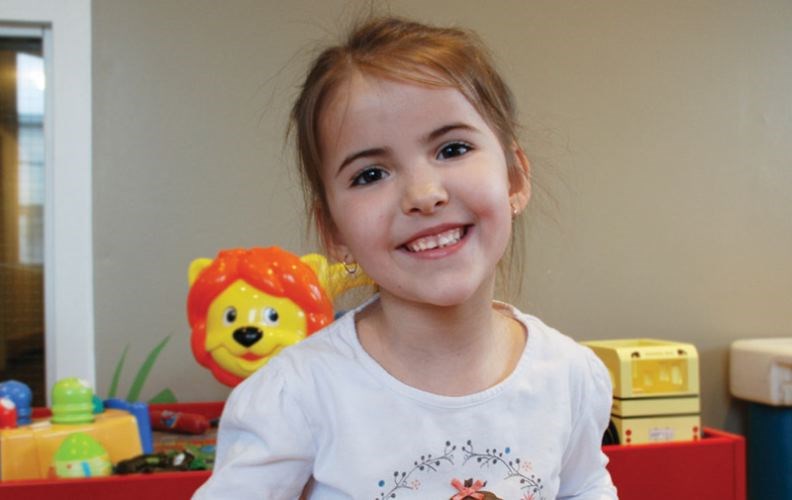For years and from her daughter's very early age Phoebe Kingsley knew there was something wrong. It was in the tilt of the girl's head, a look she'd get in her eyes, and an obvious delay in development for which doctors could assign no cause.
"She was delayed in sitting up, she was delayed in walking and talking and at her daycare centre her primary caregiver had noticed that every time she did tried to walk she would fall down," said Kingsley of her daughter Kasandra Kingsley-Furze, now seven, who goes by Kasi. "And she was always kind of tilted to the side."
Over and over the family went to local doctors and down to B.C. Children's Hospital for tests. They saw optometrists and neurologists. She had her ear, nose and throat checked.
Kasi would gain weight and then lose weight, and no one could tell the Vanderhoof family why.
"It was a long drawn out process," said Kingsley, who was no stranger to child development and at the time worked at a daycare and had early education training. "I felt like I was at a standstill. I was up against a brick wall."
Then one day in 2011, in the fruits and vegetables section at the grocery store, an off-duty paramedic stopped Kingsley.
"He said, 'She's having a seizure,' He started to explain what an absence seizure looks like," said Phoebe, adding it is a very subtle shift where Kasi stares off into space.
And as it turned out, it was happening on an almost daily basis. Kingsley, at the request of doctors, started documenting the head tilts and the seizures, including frequency and how long they lasted. She filled several log books.
The seizures meant more delays and regression in some developmental steps she'd made. After an episode, Kasi would try to recite her ABC's.
"She would get so frustrated because if it was a really bad one, she wouldn't be able to make it back to the end of the alphabet.
But it wasn't until more than a year later, just weeks after Kingsley's mother died, that the "scariest day" in Kingsley's life also launched Kasi's slow move to recovery.
"She starts having a seizure in front of the nurse and she starts vomiting," said Kingsley of a May 2012 visit to B.C. Children's Hospital. "It had never progressed to that."
Nothing they tried helped, and soon Kasi wouldn't stop seizing. The nurses hit a button, and 30 people flooded the room.
"I've never seen so many people at once," said Kingsley. "As horrible as it was it was definitely a blessing to have had it there"
Finally they tried a different medication - Keppra - which would prove life changing for Kasi's family in its ability to help control the seizures.
But the medication also cost $1,000 a month. Over the years of hospital visits, Kingsley went back to school and separated from Kasi's father, and paying that amount simply wasn't possible.
From the beginning Variety, which had its 49th annual Variety Show of Hearts Telethon over the weekend, covered the cost in its entirety. Over the two days, it raised $5,886,973 to help children like Kasi.
"I'm very blessed to have had them," said Kingsley.
Now the family have to keep an eye on her dosage, which must increase as she grows. Kasi learned how to ride a bike last fall - a big shift from a girl who had difficulty jumping with two feet or walking up stairs one at a time.
Kasi's kept some endearing quirks from her years of hospital visits and neurological check-ups.
"To end it, they always made them stick out their tongue," said Kingsley of the repetitive doctor's visits.
"When she's done with you, she'll stick her tongue out at you," said Kingsley with a laugh. "People think it's rude but that's what she's doing. She's saying 'I'm done' without saying the words."
Kingsley said she and Kasi's teacher noticed a big difference this year. While Kasi has delayed learning (she's at a five-year-old level) she's showing a desire to learn that was absent.
"She wants to do all these things that she hasn't been able to do beforehand," said Kingsley. "To see her actually gaining ground is one of the best things ever."



